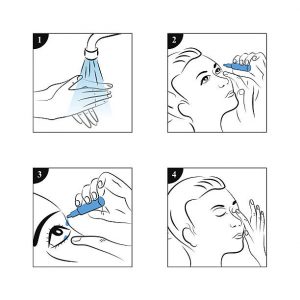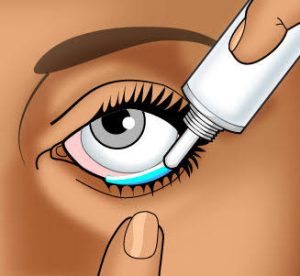
We have all made use of eye drops or ointments at one point in time. Sometimes, we complain that these eye medications do not work when we are in fact using them wrongly. Find out how you can use them properly to maximize their actions.
WHAT ARE EYE MEDICATIONS?
Eye medications are used for the eyes to diagnose, prevent, and treat eye infections and diseases.
Eye medications come in different formulations, but we are more conversant with eye drops and eye ointment.

The indications for eye medications include allergies, inflammation and swelling of the eye, eye infections (boils, conjunctivitis, blepharitis, and cellulitis amongst others), eye diseases (glaucoma, cataract etc.), eye examination during diagnosis of eye diseases, removal of foreign objects from the eyes and so on.
HOW CAN I USE EYE MEDICATIONS PROPERLY?
Eye medications should be used based on the direction from your eye doctor or physician.
When instilling or administering eye medications, take note of the following:
• Wash your hands with soap and water before and after picking up the container.
• Tilt your head backwards and look up.
• Pull your lower lid gently away from the eye to form a pouch.
• Gently instill your eyedrop into the pouch formed and close your eye to prevent the medication from draining away.
For eye ointments, gently place half-inch of ointment and simply close your eyes.

Applying eye ointments
Ointments and some eye drops may blur your vision after use. These are preferably used at bedtime.
• Avoid touching the eye or eyelid with the dropper or the applicator.
• Replace the cap on the container or tube and tighten it.
For more than one eye drops, wait at least 10minutes before instilling or administering the next eyedrop.
For eye drops and eye ointment, instill or administer the eyedrop first before the ointment. When the ointment is administered first, it coats the surface of the eye and prevents the eye drop from being absorbed.
• Eye medications should be stored in a cool dry place.
Avoid placing eye medications on top of refrigerators or surfaces that are heated up regularly. This can affect the efficacy of the medications make them ineffective.
• Eye medications used in eye examinations and removal of foreign objects from the eyes are usually administered by health care professionals.
• Avoid self-medicating eye medications; seek professional advice on purchase, use and side effects experienced from the use of eye medications.
Image credit: iStock photos

Ezike Nonye is a Pharmacist who completed her Bachelor degree from University of Lagos (B.Pharm). She is currently exploring digital marketing analytics as a novel field in Pharmacy practice while also interning at the Federal Medical Center (FMC) Abeokuta, Ogun State, Nigeria. She is a graphic designer, a blogger and an entrepreneur. She is passionate about creating new things from nature and believes that there is no limitation to what you can achieve. She is a Christian and loves writing and open to new ideas and skills.

